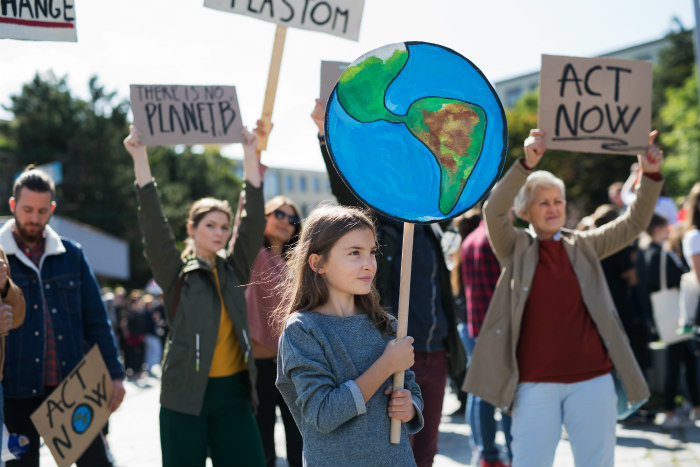
December 12 marked the fifth anniversary of the Paris Climate Agreement, a historic endeavor to reduce carbon emissions and prevent catastrophic levels of global warming. Since the Paris Agreement was signed in 2015, the urgency of climate change has only become more apparent.
Fortunately, many countries, companies, and communities are ramping up their efforts to address climate change. Here is a look at five troubling developments and five promising trends that have taken place during the lifespan of the Paris Agreement.
Let’s start with the bad news…
- The five warmest years on record have all occurred since 2015. Now, 2020 is on track to become the third-warmest year, following 2016 and 2019. If this trend continues, global temperatures might hit 1.5 degrees Celsius—the threshold for staving off the worst effects of warming —between 2020 and 2024.
- Sea level rise reaches new heights. Global sea levels have risen 21-24 centimeters since 1880, and the increase is getting faster. In 2015, the sea level was 48.6 millimeters above pre-industrial averages; in 2020, that number reached 70.4 millimeters.
- Climate change has intensified natural disasters, such as flooding, tropical storms, and wildfires. Seven of California’s 10 most destructive wildfires have occurred within the past five years, and the state saw its worst-ever wildfire season in 2020. Climate change exacerbates natural disasters on every continent, but the toll is greatest in developing nations that contribute the least to carbon emissions.
- The Trump administration’s environmental agenda undermines progress on climate action. In addition to exiting the Paris Agreement, the Trump administration rolled back more than 100 environmental regulations. These rollbacks will result in an estimated 8 billion metric tons of additional emissions by 2035—which exceeds the combined annual emissions of Canada, Germany, and Britain.
- Despite bold promises, Canada is behind on its climate goals. Canada is currently projected to fall 15 to 20 percent short of meeting its Paris Agreement pledge to reduce carbon emissions 30 percent below 2005 levels by 2030. Canada also has not fulfilled its 2020 goal to reduce carbon emissions 17 percent below 2005 levels.
Looking on the bright side…
- The United States may have exited the Paris Agreement, but the American people did not abandon their commitment to it. Shortly after President Trump’s announcement that he intended to withdraw the U.S. from the Paris Agreement, a diverse coalition of leaders launched the “We Are Still In” movement, which mobilizes non-federal entities to work toward the goals of the Paris Agreement. Signers of the “We Are Still In” declaration represent 159.3 million Americans, nearly two-thirds of GDP, and more than half of the country’s carbon emissions.
- Other countries are making ambitious plans to reduce emissions. In 2019, the United Kingdom became the first major economy to pass legislation mandating net-zero carbon emissions by 2050. Five other countries have similar laws on the books. China recently announced its intention to reach carbon neutrality by 2060, although that pledge is not binding.
- Youth activists are keeping climate change at the forefront of political debate. The Paris Agreement was signed three years before Greta Thunberg’s climate strikes galvanized a powerful wave of youth climate activism. All over the world, a new generation is pressuring politicians to address the climate crisis with greater urgency.
- Renewables are growing — even in the face of economic downturn. Renewables are the only energy source that saw an increase in demand this year, and new renewables accounted for 90 percent of worldwide growth in total power capacity.
- The financial sector is taking climate change more seriously. A group of 30 international asset managers, who collectively manage more than $9 trillion, recently committed to work towards net-zero greenhouse gas emissions in the global economy by 2050. In addition, many central banks are collaborating to account for climate-related risks.
Despite everything that has changed in the past five years, the Reform Movement’s commitment to climate justice remains steadfast. Jewish tradition emphasizes our sacred responsibility to steward the earth, tracing back to God’s instruction to the first human beings: “Take care not to spoil or destroy My world, for if you do, there will be no one to repair it after you” (Midrash Ecclesiastes Rabbah 7:13). In this spirit, we continue to advocate for policies that mitigate climate change, address its impact on vulnerable populations, and facilitate a just transition to a clean energy economy.
Next year, on the sixth anniversary of Paris, we hope to be celebrating the United States’ rejoining the agreement and passing strong climate legislation that enables us to achieve net-zero carbon emissions by 2050.
Related Posts

When ICE Comes to the Congregation Door

Supporting Immigrants and Refugees in This Challenging Moment

